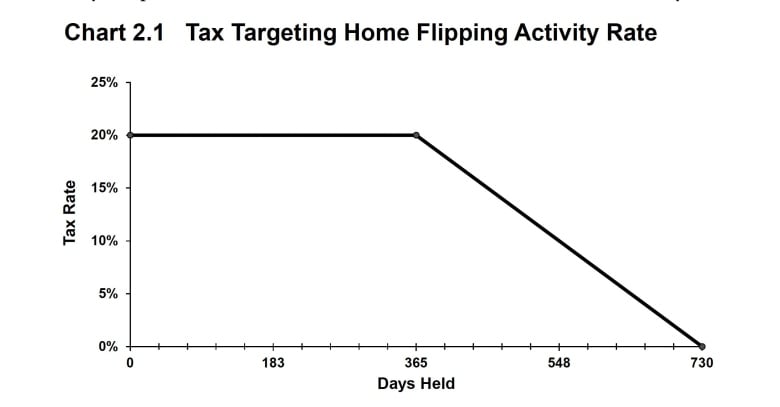Baltimore City is moving forward with a program that will sell some vacant homes for just $1.Wednesday morning, the Board of Estimates approved the program, but not everyone was on board.City Council President Nick Mosby succeeded in getting the board to defer the item two weeks ago after detailing his concerns. But the spending board passed the new pricing structure in a four-to-one vote with Mosby as the lone “No.”More than 13,000 homes in Baltimore are vacant. The city owns close to 1,000 of them. Individual buyers and community land trusts are eligible to buy the city-owned vacant houses for $1. Small nonprofits can purchase the homes for $1,000. Developers and larger nonprofits would need to pay $3,000.The hope is that area residents will buy the vacant homes or lots, fix them up and live in them. Mosby argued that without specific written protections, city residents won’t be given priority in buying the properties, and they will be pushed out when neighborhoods improve.”I did agree with a lot of the president’s concerns about the problems that we’re facing in terms of affordable housing and in some places, gentrifying of neighborhoods. I think the disagreement here today was, this is not the vehicle that’s going to address a lot of those concerns,” comptroller Bill Henry said.The new pricing structure only applies to city-owned homes that appear on the “Buy Into BMore” website.
Baltimore City is moving forward with a program that will sell some vacant homes for just $1.
Wednesday morning, the Board of Estimates approved the program, but not everyone was on board.
City Council President Nick Mosby succeeded in getting the board to defer the item two weeks ago after detailing his concerns. But the spending board passed the new pricing structure in a four-to-one vote with Mosby as the lone “No.”
More than 13,000 homes in Baltimore are vacant. The city owns close to 1,000 of them. Individual buyers and community land trusts are eligible to buy the city-owned vacant houses for $1. Small nonprofits can purchase the homes for $1,000. Developers and larger nonprofits would need to pay $3,000.
The hope is that area residents will buy the vacant homes or lots, fix them up and live in them. Mosby argued that without specific written protections, city residents won’t be given priority in buying the properties, and they will be pushed out when neighborhoods improve.
“I did agree with a lot of the president’s concerns about the problems that we’re facing in terms of affordable housing and in some places, gentrifying of neighborhoods. I think the disagreement here today was, this is not the vehicle that’s going to address a lot of those concerns,” comptroller Bill Henry said.
The new pricing structure only applies to city-owned homes that appear on the “Buy Into BMore” website.
The B.C. government has announced plans to introduce a tax of up to 20 per cent on profits made when properties are sold within two years of their purchase.
The 20 per cent rate will be in place for a year after purchase and will slide to zero between 366 and 730 days after the acquisition.
B.C. Finance Minister Katrine Conroy announced the tax as one of the province’s latest tools to try to curb speculation over housing in a province where many struggle to afford appropriate shelter.
“Prices went up as governments stepped back and speculators moved in,” said Conroy during her speech presenting her latest budget in the legislature.
“That’s why we’re bringing in a home-flipping tax as our latest measure to crack down on bad actors.”
The tax is one of 20 pieces of legislation the government plans to introduce this session, meaning it will need to be passed at some point over the next three months before becoming law.
The plan is to implement it for properties sold on or after Jan. 1, 2025. It will also apply to properties purchased before then.
Conroy’s 2024-25 budget forecasts that the tax, once in place, would result in an additional $44 million in revenue in the 2025-26 fiscal year.
That revenue will go directly to building affordable housing throughout the province, she said.

Sellers would be taxed around 10 per cent after owning a home for a year and a half, with the tax lifted after ownership for two years.
The tax will apply to income from the sale of properties with a housing unit and properties zoned for residential use. It also applies to income made from condo assignments.
It does not apply to land or portions of land used for non-residential purposes, according to the government’s budget documents.
Other exemptions under the tax include life circumstances such as separation, divorce, death, disability or illness, relocation for work, involuntary job loss, change in household membership, personal safety or insolvency.
“The purpose of this tax is to support housing supply, not impede it,” reads the government’s budget documents.
“Exemptions will be provided for those who add to the housing supply or engage in construction and real estate development.”
The tax is to be paid in addition to any federal or other provincial income taxes incurred from the sale of property.

Alex Hemingway, a senior economist with the Canadian Centre for Policy Alternatives, said although the tax is another tool to try and address speculation, he’s not sure how successful it will be.
“I think a flipping tax can take a little bit of air out of the tires in terms of speculation, but it’s not really getting at the root of the housing crisis, which is a shortage of housing overall and a shortage of non-market housing in particular.”
He also said the tax could inadvertently drive down home sales and transactions, siphoning tax revenue away from property transfers.
First-time homebuyer credit
The budget also introduced expanded property transfer tax exemptions, increasing the First Time Homebuyers Program threshold up to $500,000 on the purchase of a home worth up to $835,000.
The province said the move would result in savings of up to $8,000 per purchase and would double the number of buyers that will benefit to approximately 14,500.
The province will also waive the property transfer tax for eligible purpose-built rental buildings that have four or more units until 2030.
Legislation Creates Homeownership Opportunities for New Jersey Residents
TRENTON – Governor Phil Murphy today signed A5664/S4240, establishing a Community Wealth Preservation Program to promote equity and fairness in foreclosure sales by providing opportunities for foreclosed-upon residents and their next of kin, tenants, and other prospective owner-occupants – along with nonprofit community development corporations – to purchase and finance a foreclosed-upon home.
The current foreclosure market favors investment companies that can afford to purchase foreclosed-upon properties and sell them at a profit. The legislation helps to level the playing field, support affordable homeownership, and empower those with a vested interest in the community to purchase property.
“For too many, the dream of homeownership feels far out of reach,” said Governor Murphy. “With today’s bill signing, we are creating a new avenue to homeownership for individuals and families throughout New Jersey, giving many the opportunity to remain in the homes and communities they cherish while also protecting our neighborhoods from rapid investor-driven homebuying.”
“This new law shows that New Jersey is continuing to find creative ways to create affordable homeownership opportunities for families and, in the process, ensure more homes stay owned by local residents,” said New Jersey Department of Community Affairs Acting Commissioner Jacquelyn A. Suárez. “With the Community Wealth Preservation Program, it is now much easier for all residents to buy a home to live in at a sheriff’s sale because of the lower deposit required and the extra time to come up with money for the remaining balance. Rather than corporations and investors buying the homes to rent or flip for profit, everyday families now have a better opportunity of purchasing a house they can call home for generations to come.”
Then-Assemblywoman, now-Senator Britnee Timberlake championed this legislation in the Legislature. Additional primary sponsors include Senators Andrew Zwicker and Shirley Turner and Assemblymembers Shanique Speight, Shavonda Sumter, and Benjie Wimberly.
“New Jersey is consistently in the top three in the nation with the highest foreclosures. Our state also has the widest racial wealth gap in the country. Black and brown wealth is hemorrhaging through the loss of foreclosed property, and the people who live in the community often do not have deep enough pockets to even participate in the foreclosure process. This bill is a creative opportunity for families to save their wealth at the time of a foreclosure sale by using financing,” said Senator Britnee Timberlake. “This legislation also levels the playing field for renters, affordable housing non-profit developers and people who want to purchase an abandoned home to restore and live in or to create affordability. This is what equity in systems look like.”
“Community wealth preservation represents an important way of ensuring affordable housing opportunities remain with the local community, stabilizing neighborhoods, and improving lives, all the while making a variety of other positive impacts that will boost our towns economically and socially and keep them viable for future generations to come,” said Senator Andrew Zwicker.
“Too often foreclosed properties are bought up by real estate investors and developers only looking to make a profit,” said Senator Shirley Turner. “This legislation will help to keep property ownership within the community. By creating pathways for owners, tenants and local organizations to make purchases at sheriff’s sales we can help to keep money in the community and keep people in their homes.”
“The current process for buying foreclosed houses favors companies that have the money to purchase property at sheriff sales and resell it for a profit,” said Assemblywoman Shanique Speight. “By enacting the changes detailed in this bill, we can give people vested in their community a better chance of securing a home at these sales.”
“Home ownership is an important way to build generational wealth, and this bill combats housing insecurity,” said Assemblywoman Shavonda Sumter. “The trauma of losing the family home due to foreclosure leaves a lasting emotional scar. This bill makes it easier for families to support one another, buy that home at a sheriff’s sale and keep it in the family.”
“We need to make housing affordable and accessible, especially in Black and brown neighborhoods and the ‘Community Wealth Preservation Program’ does that. This legislation provides an opportunity for many New Jerseyans who want to own a home and join a community,” said Assemblyman Benjie Wimberly. “We’re removing barriers that stand in the way of a potential homeowner’s success at sheriff sales.”
“Today we are taking a major step to address NJ’s enormous racial wealth gap, the largest in the nation,” said Staci Berger, president and chief executive officer of the Housing and Community Development Network of NJ. “The Community Wealth Preservation Program will help to HouseNJ by preventing the loss of a family’s greatest asset — their home. This landmark legislation, which has been persistently championed by Senator Britnee N. Timberlake during her time in the Assembly, allows relatives to keep their home within their family when possible, and allows nonprofit developers to help keep the property affordable when not. NJ needs to do everything we can to prevent foreclosures, which contribute to the racial wealth disparity, and provide people with safe and stable housing. We thank all the sponsors including Senators Timberlake and Andrew Zwicker, our legislative leaders, and Governor Phil Murphy for their leadership and commitment to bring this generational wealth building tool to New Jerseyans.”
“The bill puts the interests and wellbeing of people before corporate real estate interests and protects families and communities from the disruption and devastation caused by foreclosure,” said New Jersey Citizen Action’s Financial Justice Program Director, Beverly Brown Ruggia. “The legislation is an important step toward reversing the devastating impact of the great recession and foreclosure crisis on black and brown families in New Jersey. It will help ensure that the chain of generational wealth building through home ownership isn’t broken when a family falls on hard times. We want to especially thank Senator Britnee Timberlake for championing this bill, and Governor Murphy for signing it into law.”
“We are pleased to see Governor Murphy sign this critical piece of legislation into law. Providing expanded opportunities for Black and Brown communities to retain wealth through homeownership is vital. Closing the racial wealth gap in New Jersey will require more work, but the Community Wealth Preservation Act will create a desperately needed pathway and is a great step in the right direction. We commend Senator Timberlake for her leadership and advocacy in championing this bill,” said James Williams, Director of Racial Justice Policy at the Fair Share Housing Center.
“This legislation is an important step in addressing New Jersey’s racial wealth gap by preserving housing wealth in families and communities rather than turning it over to outside investors,” said Laura Sullivan, Director of the Economic Justice Program at the New Jersey Institute for Social Justice. “This new policy is especially important in New Jersey where people of color face some of the worst racial wealth disparities and are most vulnerable to foreclosure.”



